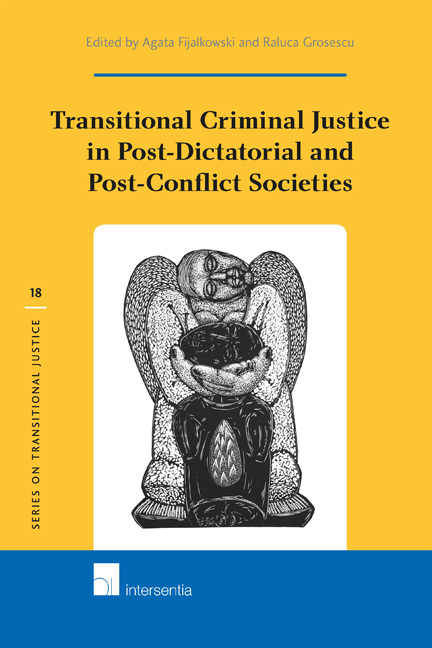Book contents
- Frontmatter
- Contents
- Introduction
- PART I CRIMINAL JUSTICE AS A METHOD OF DEALING WITH THE PAST: OPPORTUNITIES, STRATEGIES, AND LEGAL AND POLITICAL CONSTRAINTS
- PART II UNIVERSAL PRINCIPLES V LOCAL PECULIARITIES: THE RELATIONSHIP BETWEEN NATIONAL JURISDICTIONS AND INTERNATIONAL LAW
- Chapter 7 International Politics of Justice: The Political Underpinnings of the Emergence of an International Regime
- Chapter 8 Positive Complementarity: Fine-Tuning the Transitional Justice Discourse? The Cases of the Democratic of Congo, Uganda and Kenya
- Chapter 9 Punishing Mass Atrocities: Penological Developments in the Aftermath of the Rwandan Genocide
- Chapter 10 International and National Legal Assessment of Crimes Committed by the Communist Regimes: Lithuanian Case Study
- Chapter 11 Conclusions
- About the Authors
Chapter 10 - International and National Legal Assessment of Crimes Committed by the Communist Regimes: Lithuanian Case Study
from PART II - UNIVERSAL PRINCIPLES V LOCAL PECULIARITIES: THE RELATIONSHIP BETWEEN NATIONAL JURISDICTIONS AND INTERNATIONAL LAW
Published online by Cambridge University Press: 28 November 2017
- Frontmatter
- Contents
- Introduction
- PART I CRIMINAL JUSTICE AS A METHOD OF DEALING WITH THE PAST: OPPORTUNITIES, STRATEGIES, AND LEGAL AND POLITICAL CONSTRAINTS
- PART II UNIVERSAL PRINCIPLES V LOCAL PECULIARITIES: THE RELATIONSHIP BETWEEN NATIONAL JURISDICTIONS AND INTERNATIONAL LAW
- Chapter 7 International Politics of Justice: The Political Underpinnings of the Emergence of an International Regime
- Chapter 8 Positive Complementarity: Fine-Tuning the Transitional Justice Discourse? The Cases of the Democratic of Congo, Uganda and Kenya
- Chapter 9 Punishing Mass Atrocities: Penological Developments in the Aftermath of the Rwandan Genocide
- Chapter 10 International and National Legal Assessment of Crimes Committed by the Communist Regimes: Lithuanian Case Study
- Chapter 11 Conclusions
- About the Authors
Summary
This chapter deals with the legal qualification of the crimes committed by the totalitarian Communist regimes, which has recently become a topic of wide discussion within the European Union. I focus on the opinions expressed by various European institutions and on the Lithuanian case study as an example of how those crimes are dealt with. I argue that in general those crimes can be qualified as war crimes and crimes against humanity, and in some instances even as genocide.
The specific feature of the Baltic States is that the Communist crimes were committed under foreign occupation. I analyse the following characteristics of the legal treatment of those crimes in Lithuania: first, Lithuanian laws are based on the universality of the Nuremberg principles; second, Lithuania adheres to a broader definition of genocide that also covers acts directed against social and political groups. The chapter concludes that, apart from criminal investigations and trials, and compensation to the victims, the emphasis should also be made on the general condemnation of the Communist crimes and prosecution for public condoning, denial and gross trivialisation of those crimes.
INTRODUCTION
The crimes committed by totalitarian Communist regimes is a topic that has only recently become a theme of Europe-wide debate, though has quite a long time (from between two and eight decades, depending on the country and on concrete crimes) passed since the commission of these crimes. One can point to several reasons why this debate came onto the European agenda relatively recently. First of all, it could happen only with the accession to the European Union of a number of post-Communist and formerly USSR occupied countries from Central and Eastern Europe. Unlike the older EU members, these countries had suffered from not only the Nazi (national-socialist), but also even longer from the Soviet (Communist) totalitarian regimes. Secondly, the debate on the crimes committed by the Communist totalitarian regime was inspired largely by the initiative to adopt the 2008 EU Council Framework Decision on combating racism and xenophobia by means of criminal law. It included criminalisation of public condoning, denial and gross trivialisation of crimes committed by the Nazi totalitarian regime, or of the crimes of genocide, crimes against humanity and war crimes directed against groups of persons defined by reference to race, colour, religion, descent or national or ethnic origin.
- Type
- Chapter
- Information
- Publisher: IntersentiaPrint publication year: 2015



